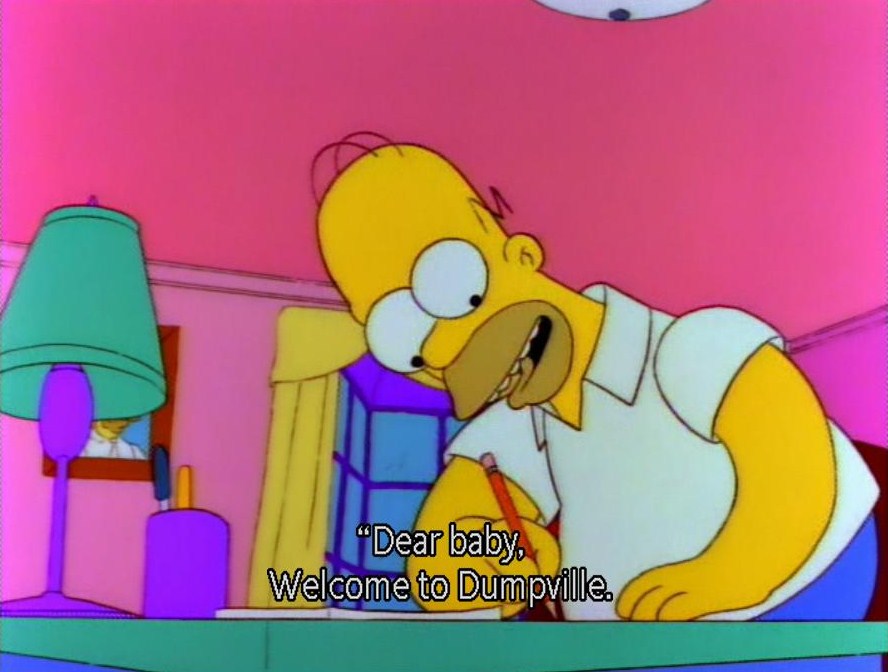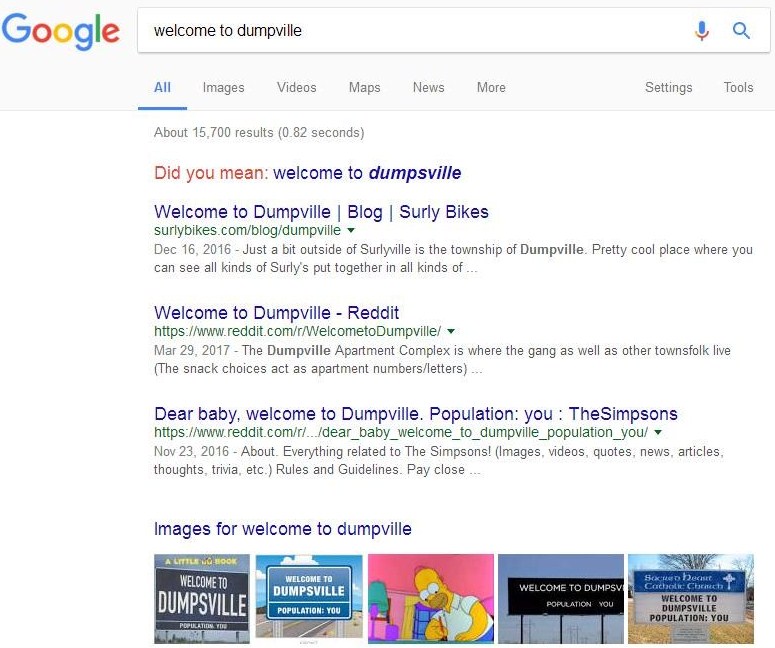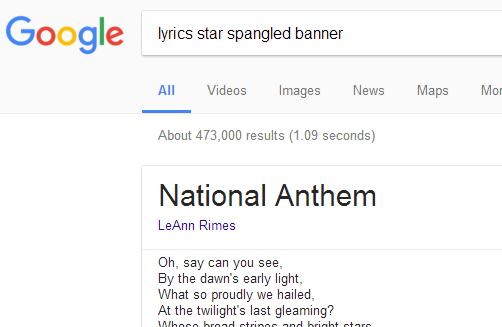
Welcome to Mistakeville. Population: Some of You
Earlier this month, one of my esteemed Postmedia colleagues did the unthinkable: He misquoted The Simpsons.
It's an insignificant blemish on an otherwise solid column, but if you want to see for yourself, the incorrect usage of the quote is still visible on a number of the company's websites. The offending text reads: "Welcome to Dumpsville. Population: You."
Any real Simpsons fan will recognize the line, and the truly pathetic of us can immediately tell you the context: Homer begins to write a breakup letter on Bart's behalf in the Season 3 episode Bart the Lover. The most pedantic of that group, of which I am apparently a member, will inform you the line is in fact "Welcome to Dumpville. Population: You." Note the lack of an S in Dumpville.

See, there it is, right on the DVD's subtitles. The episode is a personal favourite of mine, but in the script's 20-plus memorable minutes, this line always stood out to me because so many people make that mistake. I've always been confused by this - if you play the clip, Homer unmistakably says dumpville, without any distortion or slur. (I'd link a bit of the clip on YouTube, but in the interest of keeping this piece evergreen, I won't include a URL that's sure to be dead in a matter of weeks and will instead let you go dig it up yourself if need be.)
Now, some of you may be howling, why didn’t the author of the Postmedia article simply Google the line in question to make sure he got it right? Here’s the problem: Google will not steer you right on this one.

The phrase "Welcome to Dumpville" yields 15,700 hits on Google, while "Welcome to Dumpsville" is just a touch lower at 14,900 results. Worse still, Google tries to correct you on the dumpville search, and includes a bunch of pictures that say "Welcome to Dumpsville." You can see how a normal, well-adjusted, not-Simpsons-obsessed person could make this mistake on deadline. The moral of this story: The way Google now spits out information at the top of a search can yield some very poor information. Believe it or not, neither Jimi Hendrix nor LeAnn Rimes wrote The Star-Spangled Banner. (Click the image below to see who Google thinks wrote it this week!)

So now we have an idea what went wrong. Now the question is, why did it go wrong? Where did the S come from? Search just the word dumpsville and it appears to have no meaning outside of Simpsons references. Dumpville, however, was the name of a late-19th-century San Francisco shantytown and a small turn-of-the-century Missouri community east of Kansas City. I don't know that either of those were notorious enough to have influenced the Simpsons dialogue.
Most of us will recognize the -ville suffix as a form of slang, which is unquestionably the context in which Homer writes about Dumpville. The origins of this, as with a lot of slang, are shrouded somewhat in mystery. The Oxford Canadian dictionary says this form of slang is chiefly North American, while its Collins counterpart specifies it further as a U.S. thing. Thumbing through a few dictionaries, we find a few common uses of this construction: dullsville, hicksville, dragsville, squaresville, disasterville, gloomsville.
If we plug three of these into the handy-dandy Google Ngram viewer (see, Google ain't all bad) we get the sense that, again, like with a lot of North American slang, this took root post-Second World War.
Of note: The dullsville construction, which I might say is the most well-known use of this suffix, appears to have been at its height in the 1980s, shortly before when this Simpsons episode first aired in 1992. Also worth mentioning: Singular forms like dullville, hickville and squareville don't show up on the Ngram viewer at all (and we don’t get dumpville or dumpsville). We know that people will often default to the pluralized construction, even if we don't know why they do it.
Ville is the French word for city, and was a common suffix used in naming towns during a particular period of westward expansion in North America, especially the United States. (The Missouri Dumpville seems to have been named after a man with the surname Dump.) Most of the major -ville communities appear to be around the northern part of the U.S. South and the neighbouring Midwest. The two best known are probably Nashville, Tenn., and perhaps Jacksonville, Fla. These can include the S - as an example, John Hunt founded Huntsville, Ala. - but many don’t and the largest -ville cities do not.
While I can’t come up with any firm answers about -ville versus -sville, the construction as a form of slang has a clear genesis in the Hooverville. These Depression-era shanty towns, named for presiding U.S. president Herbert Hoover, existed in a time when the founding of -ville communities was on the edge of living memory, and at the tail end of the Vaudeville genre. Unquestionably, the phrase Hooverville both predates phrases like dullsville and dumpville, and is far more common than those have ever been:
My best guess is, as so often happens with the corruption of the English language, people go with what sounds best. Disastersville is maybe a bit too long, and perhaps dullville lacks that extra consonant to break up all those Ls. And maybe all those people who say dumpsville instead of dumpville are borrowing from that more popular dullsville phrase anyway.
If you've got any better ideas, feel free to drop me a line at justin@meetjustinholmes.com.
|
CONTACT
Feel free to email me at JUSTIN@MEETJUSTINHOLMES.COM or use the quick form below:
|
|
|